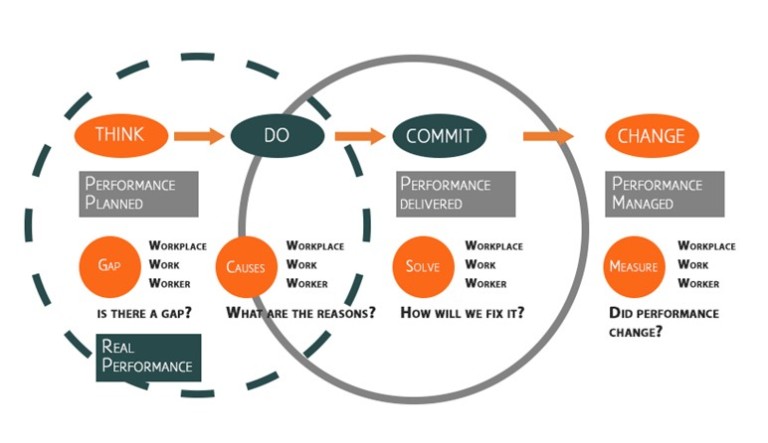For decades organisations have been fixated on performance management systems that measure and rate an individual’s performance. Managers tirelessly try to improve their staff’s performance and productivity and seldom succeed. In addition, the whole process often leaves employees anxious and demotivated.
So why is this practice continuing?
It seems the system is broken… What started as a sound theory has evolved into something that is not conducive to improving performance in organisations.
This is probably the reason why many big companies are abolishing traditional systems and opting for something closer to the original core of performance management. They have also realised this is more in line with the modern-day employee/work landscape.
But if the system is broken how do we fix it?
Let’s consider some of the “old” and “new” ways of managing performance (taking into account that 50% of the workforce are millennials):
| “Old” | “New” |
| Based on policies and procedures “We”-based Focus on the team Cumbersome and complex “Old” technology One-on-one feedback Three times per annum |
Fewer rules “Me”-based Focus on the individual Simple and easy “New” social media type technology “Crowd-source” feedback Now, immediate and often |
I quote from a client:
“There is a sense that traditional performance management is no longer about performance but, first and foremost, more about policies, regulations and compliance. The over-regulation has transformed and killed what was a theoretically and if correctly implemented, a sound idea. Organisations are battling with performance management and I think the journey to improving people performance is not only long but arduous indeed.”
Managers are held back by unnecessary ‘red tape’ and as a result have moved away from the original core of what performance management should be.
It’s vital to look at performance in a different way…
The new agenda for performance management is:
- Performance mentoring and coaching
- Total involvement
- Continuous communication
- Relevant information shared
- Employees require specific and meaningful goals
- They are aspirational
- Immediate gratification – becomes bored when career goals are not met
- Don’t want to be held back by policies and procedures
For too long organisations and managers have been too people-focused – not realising that optimum performance occurs in a total system where other sub-systems have an influence on performance too.
These sub-systems include: organisational level factors (referred to as workplace), operational factors (referred to as work) and people factors (referring to as worker). In order to create the perfect environment for optimal performance, managers should be able to proactively analyse ALL these factors. Too often managers recommend that employees attend a training programme when they’re under-performing. Nevertheless, training as a solution may or may not affect their performance positively. Real performance will be the outcome of performance management systems when performance is managed holistically as indicated below.
The new agenda for managing performance is about:
Tell me “now”. Employees want immediate feedback – we live and work in an immediacy due to the availability of information through technology.
Keep the information simple. For too long performance systems have been cumbersome and became a ‘tick-box’ exercise.
Immediate gratification – immediate feedback. We also have become citizens in the ‘throw-away’ society and want an immediate answer and fix.
Future focused – want to move up. Millennials are career ‘jumpers’ and will move to another organisation if their ambitions are not realised.
No theory – translate goals into immediate application. Modern-day employees want practical feedback and assistance.
Performance restlessness. This is linked to the ‘immediacy’ that is required and it is not only Millennials who become restless. Due to fast and often changes most people become restless, particularly with performance feedback scheduled traditionally once a quarter.
Bespoke. The new way of managing performance requires that systems are bespoke for groups of employees, work and project teams as well as per industry type.
How do we fix it?
- Step 1: Interpret organisational goals in understandable chunks.
- Step 2: Simplified strategy of how to manage performance – “one pager”.
- Step 3: Translate to small bites/goals for each individual.
- Step 4: Make the goals practical – avoid theory and unnecessary complexity.
- Step 5: The process must be totally transparent.
- Step 5: Involve the entire “value chain” to develop bespoke goals and objectives.
- Step 6: Create a performance culture and hold managers responsible and accountable.
- Step 7: Create a culture of recognition for value contributions
- Step 8: Get back to basics and focus attention on the leadership capability to give feedback.
- Step 9: Contextualise performance requirements and focus on the entire value chain delivery.
Belia Nel CPT is founder and CEO of Improvid Performance Consulting. She is currently on the international board of directors in the USA and founding member of ISPI EMEA. She is also the author of two books: “Performance in a Box“ and “Human Performance Technology“.


